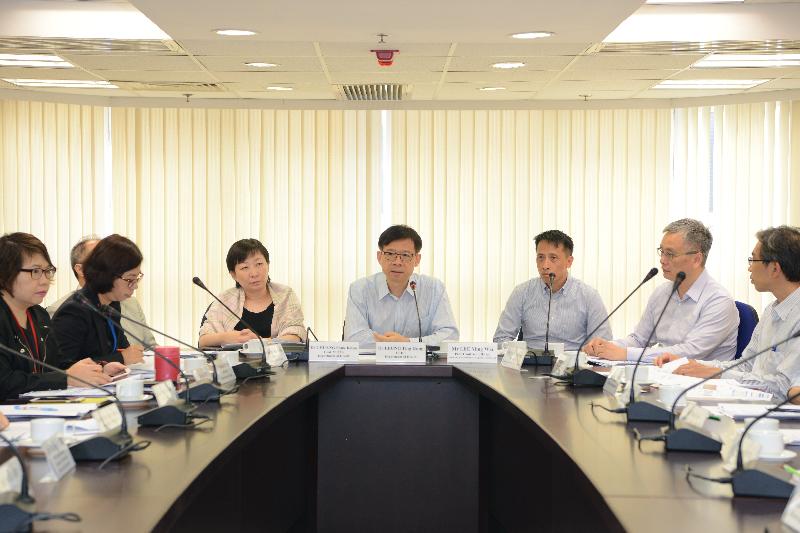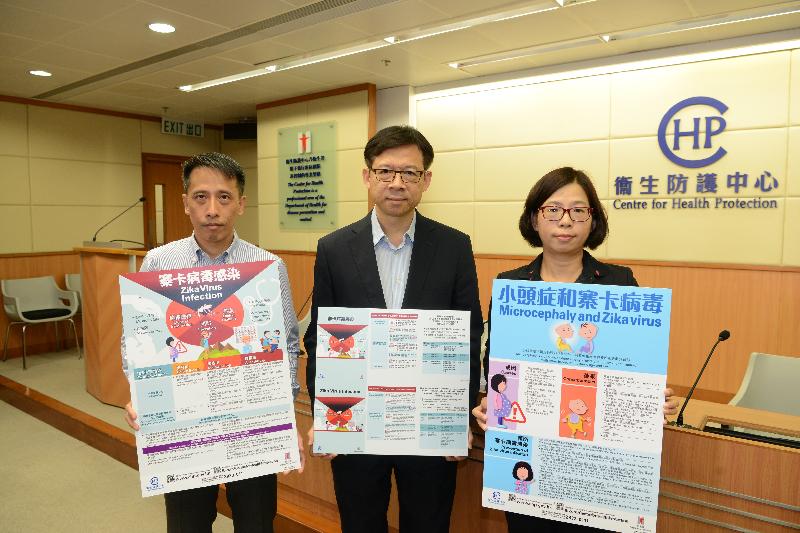Interdepartmental efforts and personal protection urged amid mosquito-borne disease threats (with photos)
******************************************************************************************
The Interdepartmental Coordinating Committee on Mosquito-borne Diseases (ICC) convened a meeting this afternoon. The Chairman of the ICC and Controller of the Centre for Health Protection (CHP) of the DH, Dr Leung Ting-hung, said after the meeting, "Since mid-July, we have recorded the first dengue fever (DF) and Japanese encephalitis (JE) cases this year suspected to be locally acquired. The first JE positive sample of local adult Culex quinquefasciatus was also identified and ovitrap indices (OIs) for Aedes albopictus are on the rise.
"We expect more travellers returning to town before the summer vacation ends and those from the Olympics in Brazil where Zika and dengue viruses are prevalent. We are facing risks of importation of these VBDs. All sectors should step up efforts on mosquito control and members of the public should use insect repellents to protect themselves, their families and the community."
A. Zika Virus Infection
According to the World Health Organization, the number of areas with mosquito-borne Zika virus transmission since 2007 increased to 68, and 51 of them (75 per cent) had their first outbreak in the past two years since 2015, while 11 reported sexual transmission. There is scientific consensus that Zika virus is a cause of microcephaly and Guillain-Barré syndrome.
To date, 22 cases of Zika Virus Infection have been imported to the Mainland including 14 in Guangdong, seven of which transited in Hong Kong. Dr Leung highlighted that, with more areas affected, emerging modes of transmission, most patients being asymptomatic, the presence of a possible vector locally, and the safety of fertility, blood transfusion and organ donation remaining under research, travellers should adopt strict anti-mosquito measures and safe sex to prevent Zika virus infection during and after travel. Those returning from affected areas should apply insect repellents for at least 21 days upon arrival.
B. Dengue fever and Japanese encephalitis
Regarding DF, from August 5 to 10, four additional imported cases were confirmed and patients had been to the Philippines (two), Bangladesh (one) and Indonesia (one) during the incubation period. The 72 imported DF cases so far in 2016 were mainly from Indonesia (30), Thailand (nine), Malaysia (eight) and the Philippines (eight). DF and JE cases since 2014 are tabulated below:
| Cases | Dengue fever | Japanese encephalitis | ||||
| 2014 | 2015 | 2016* | 2014 | 2015 | 2016* | |
| Local | 3 | 2 | 0 | 3 | 1 | 0 |
| Imported | 109 | 110 | 72 | 2 | 0 | 0 |
| Under investigation | 0 | 0 | 1 | 0 | 0 | 1 |
| Unclassified | 0 | 2 | 0 | 0 | 1 | 0 |
| Total | 112 | 114 | 73 | 5 | 2 | 1 |
Following human cases suspected to be acquired locally and the positive local mosquito sample, the CHP conducted epidemiological investigations and health talks in vicinities where patients frequented and where the sample was collected for active case finding, as well as medical surveillance for contacts. To date, no abnormalities have been detected. The public should call the hotlines for DF (2125 2266) or JE (2125 1133) for testing or referral if symptoms develop.
"Apart from using insect repellents during travel, upon returning to Hong Kong from DF endemic areas travellers should continue to do so for 14 days to avoid secondary spread by infected mosquitoes arising from imported infections," the Principal Medical and Health Officer (Surveillance Section) of the CHP, Dr Yonnie Lam, advised.
C. Vector surveillance and control
While the overall monthly OI for Aedes albopictus in July is pending, OIs in seven areas have already exceeded 20 per cent (alert level) and reached Level 3 (out of four levels), indicating that infestation of Aedes albopictus had exceeded one-fifth of the area surveyed. They were Tuen Mun North (27.4 per cent), Tin Hau (26.9 per cent), Yuen Chau Kok (26.3 per cent), Kai Tak North (23.7 per cent), Deep Water Bay and Repulse Bay (22.2 per cent), Tsim Sha Tsui East (20.4 per cent) and Ngau Chi Wan (20.0 per cent).
"Eggs of the DF vector, Aedes albopictus, can well withstand drought and breed in small containers such as cans, discarded tyres and tree holes holding small amounts of water, whereas the JE vector, Culex tritaeniorhynchus, breeds in pools, slow-running streams and ditches. Property management companies may refer to our guidelines while selecting pest control companies," the Pest Control Officer In-charge of the FEHD, Mr Lee Ming-wai, said.
The third phase of the territory-wide Anti-mosquito Campaign 2016 will be launched on August 15 and will run for 10 weeks. The second round of intensive mosquito prevention and control exercises will also be carried out from August to October in respective venues.
D. All-out efforts
Hong Kong had an exceptionally hot June and an extremely hot July. As it is expecting normal to above-normal temperature this summer and normal to above-normal annual rainfall, hot weather and abundant water leading to rapid vector proliferation is expected.
"Local experience shows that places where DF and JE patients frequented include parks, work sites, housing estates, villages and rural areas. Stagnant water may easily accumulate and be favourable for mosquitoes to breed. Mosquito control in these places requires effective and sustained efforts from the public and private sectors as well as their contractors and stakeholders. We will continue to enhance public education and put in place recommendations of our Scientific Committee on VPDs in our prevention and control strategy," Dr Leung said.
Ends/Thursday, August 11, 2016
Issued at HKT 17:22
Issued at HKT 17:22
NNNN






